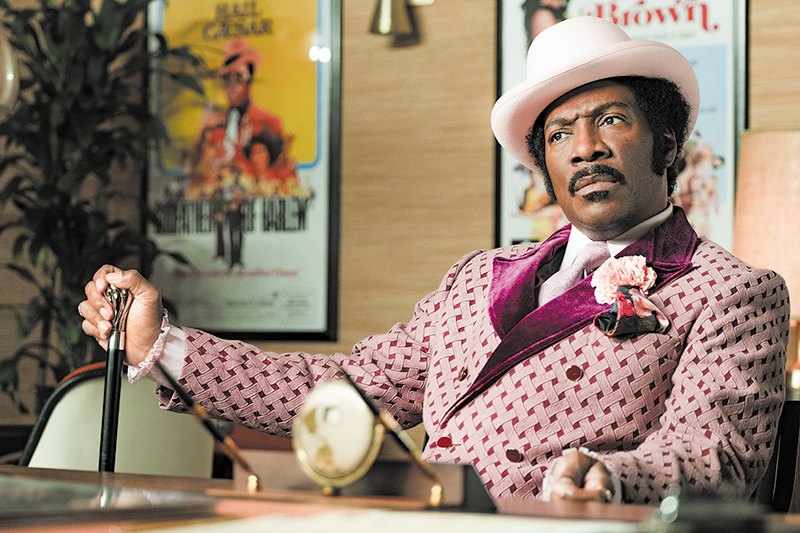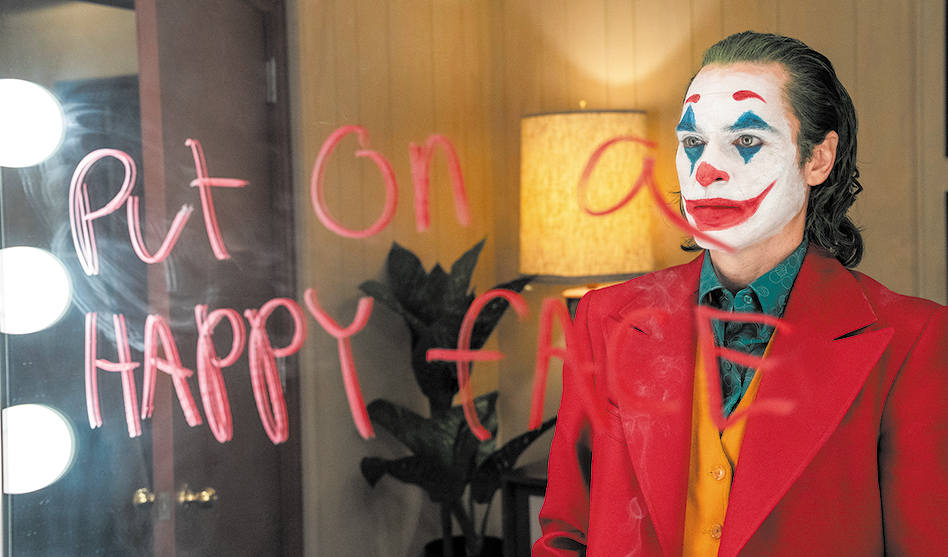Joaquin Phoenix as the troubled soul who becomes ‘Joker.’
Genius takes on different forms in ‘Joker’ and ‘Dolemite Is My Name’
ARNOLD WAYNE JONES | Executive Editor
jones@dallasvoice.com
In the original DC Comics creation, The Joker was one of Batman’s better nemeses, known as the Clown Prince of Crime. He was a trickster, maybe a bit mad, but there wasn’t much substance to it. (Remember Cesar Romero’s version on the 1960s sitcom.) But Vietnam and Watergate and 9/11 have made even our comic book villains avatars worth deep-seated psychological investigation; Heath Ledger’s take was as a man without a past — pure id, the embodiment of chaos. What backstory could justify his embrace of self-destructive anarchy?
The answer comes courtesy of an unlikely source: writer-director Todd Phillips, he of Borat and The Hangover series. That pedigree hardly prepared me to consider his capacity for introspection, even a style as disconcerting as Joker.
In Joaquin Phoenix, Phillips has found an equally improbable actor to portray the laughing miscreant, a mentally ill party clown named Arthur Fleck, who’s loaded up on Thorazine, Clonazepam and so many other pills he rattles when he walks. Arthur is one of the faceless (almost literally — he’s masked behind white pancake) denizens of 1980s Gotham brutalized by a city seized by garbage strikes, vandalism, gang violence and urban decay. He’s a victim as much as anyone … perhaps more so, because he’s sick. He’s a study in repressed rage and the volcano that bursts forth when that rage needs a release valve.
In that way, Arthur is a kind of Bernie Goetz, a vigilante embodying the frustration of the 99 percenters. But in another, he’s a dangerous psychotic… a Travis Bickle. And indeed, the presence of the real Travis Bickle, aka Robert DeNiro, draws inescapable comparisons of Joker to Taxi Driver as well as The King of Comedy. You detect a lot of cognates in Phillips’ construct, in fact, which at first seem derivative but which ultimately add more depth; Network and Psycho are also patently alluded to, and even the billionaire industrialist Thomas Wayne comes off as a Trumpian capitalist who treats citizens like detritus (begging the question: Did he get what he deserved?) The power of the film grows with Phoenix’s disturbingly brilliant performance (that chilling laugh!) and Phillips’ unrelenting bleakness with underlying satire. The message of Joker seems to be, when a city’s on fire, let it burn.

By the time Rudy Ray Moore was 45 in the early 1970s, he had done precisely nothing of note in his life, despite his best efforts to be famous for … something. Then he stumbled on a concept for his lame standup routine: Creating the character Dolemite, a rhyming, obscene pimp whose vulgarity struck a chord with urban audiences. He decided to ride the wave of popularity and produce and star in his own comedic Blaxsploitation movie, despite knowing zero about filmmaking. The result, Dolemite, became a cult hit and spawned a half dozen more schlocky action comedies.
“The accidental genius” should probably be considered a genre in and of itself — movies about “creatives” whose fearlessness combine with ignorance, a trace of passion and enough money to turn out something sensational almost despite their own efforts. Screenwriters Scott Alexander and Larry Karaszewski have waded through the swamp of darkly comic Horatio Alger tales before, with Ed Wood, The People vs. Larry Flynt, Big Eyes and Man on the Moon, and only the subject of the last one (Andy Kaufman) could be considered the result of intentional talent rather than charlatanism; add to that catalogue Dolemite Is My Name. Even more than their other films, this one calls to mind another one they did not write, The Disaster Artist, being about a first-time filmmaker who achieves unlikely heroic status, only Rudy Ray Moore, played by Eddie Murphy, is less of a buffoon that Tommy Wiseau; he’s scrappy and naive, but he does have a skillset at making people laugh… not unlike Murphy himself.
He’s been playing a variation on this character since he shot to stardom in the early ‘80s — the overly confident, fast-talking hustler destined either for riches or panhandling, but nothing in between. Murphy has aged into the persona with his charisma and some acting chops intact. His performance is magnetic, even if this style of biopic is reductive (the hero always seems to “discover” a path that should have been obvious). He’s great, but it’s actually Wesley Snipes as the pompous self-important director who steals his scenes with a combination of being seemingly drunk and effete. If the story spins out predictably, it nevertheless managers plenty of laughs and reminds some of us a time when Eddie Murphy was comedy. It’s like getting two rediscoveries in one.


